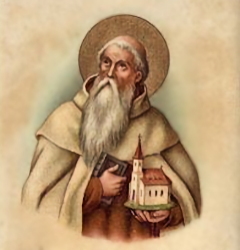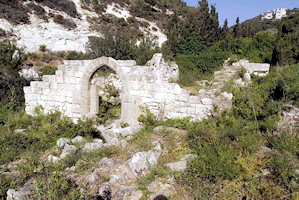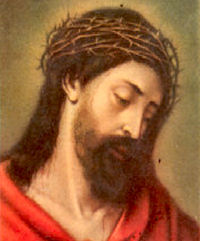Lent: March 29th
Monday of the Fifth Week of Lent
Other Commemorations: Bl. Berthold of Mount Carmel (RM) ; Other Titles: Berthold of Calabria
» Enjoy our Liturgical Seasons series of e-books!
"I am the light of the world. Whoever follows me will not walk in darkness, but will have the light of life." (Jn 8:12:) Like the forty day's fast of the Ninevites, our Lent continues in complete confidence in divine mercy; but our hope is founded not so much on our poor efforts at penance but on the passion of our Savior. No one is excluded from the redemption effected by the Blood of Christ; His grace is promised to all who believe in Him.
The Station, at Rome, is in the church of St. Chrysogonus, one of the most celebrated martyrs of the Church of Rome. His name is inserted in the Canon of the Mass.
Meditation
What do we do for the salvation of souls? It is true that we pray for one another, offer a few words of comfort, and do each other slight favors; but we do little more. Christ was more generous. He endured the crowning of thorns and dragged the heavy cross to Calvary. We pamper our bodies as if they were our last end. We prefer to have our heads crowned with laurels and roses. We are impatient and consider ourselves unfortunate whenever we are called on to carry a mere splinter of the cross of Christ. Are we one in spirit with Him?
Now, during Passiontide, we must begin to love and treasure pain and suffering. In the cross, in suffering, in our crucifixion with Christ, we shall find salvation. For Him and with Him we should bear all the slight injustices committed against us. For Him we should suffer freely and willingly the unpleasant and disagreeable things that occur to us. But our faith is weak. We flee from the cross instead of holding it dear, instead of loving it and welcoming it as our Savior did.
What St. Paul says of many Christians of his day is equally true of many in our time: "For many walk, of whom I have told you often (and now tell you weeping) that they are enemies of the cross of Christ. Whose end is destruction; whose God is their belly; whose glory is in their shame; who mind earthly things" (Phil. 3:18 f.). — Excerpted from The Light of the World by Benedict Baur, O.S.B.
Bl. Berthold of Mt. Carmel
 Blessed Berthold seems to have had a connection with the beginnings of the Carmelite Order. He was a relative of Aymeric, the Latin patriarch of Antioch who was installed in Antioch during the crusades. At the time, there were a number of hermits from the West scattered throughout Palestine, and Berthold gathered them together, founded a community of priests who settled on Mount Carmel, and became their first superior.
Blessed Berthold seems to have had a connection with the beginnings of the Carmelite Order. He was a relative of Aymeric, the Latin patriarch of Antioch who was installed in Antioch during the crusades. At the time, there were a number of hermits from the West scattered throughout Palestine, and Berthold gathered them together, founded a community of priests who settled on Mount Carmel, and became their first superior.
There is a legend that he was born at Limoges in France, studied in Paris, and was ordained a priest there. According to the legend, he accompanied Aymeric on the crusades and found himself in Antioch when it was being besieged by the Saracens. Through his urgings, the Christians in Antioch turned to prayer and penance, and the city was delivered.
What is known for certain is that Bl. Berthold directed the building of a monastery and church on Mount Carmel and dedicated the church in honor of the prophet Elias, who had defeated the priests of Baal there and seen the vision of the cloud out over the sea. This is confirmed in a letter of Peter Emilianus to King Edward I of England in 1282.
 Berthold lived out his days on Mount Carmel, ruling the community he had founded for forty-five years until his death about 1195. His example and way of life stamped the beginnings of the Carmelite Order, leading to the drawing up of the order’s rule by St. Albert, Latin patriarch of Jerusalem, about 1210. That rule was approved by Pope Honorius III in 1226 and it is this primitive rule that is considered the foundation of the Order of Mount Carmel.
Berthold lived out his days on Mount Carmel, ruling the community he had founded for forty-five years until his death about 1195. His example and way of life stamped the beginnings of the Carmelite Order, leading to the drawing up of the order’s rule by St. Albert, Latin patriarch of Jerusalem, about 1210. That rule was approved by Pope Honorius III in 1226 and it is this primitive rule that is considered the foundation of the Order of Mount Carmel.
But it seems to have been Berthold who first organized the monastic life of the hermits on Mount Carmel and governed them until his death. St. Brocard, who apparently was his successor, petitioned Albert to compose a rule for them, undoubtedly codifying and completing the work begun by Berthold.
—Taken from ucatholic.com
Highlights and Things to Do:
- Read more about Bl. Berthold:
- Read more about about the Order of Carmel: On the History and Spirit of Carmel.






